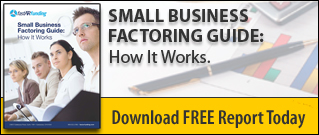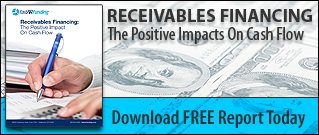 As we are well underway in 2013, I’m sure if you own a small business you’ve thought about how you can make your business better, even if you had a solid 2012.
As we are well underway in 2013, I’m sure if you own a small business you’ve thought about how you can make your business better, even if you had a solid 2012.
You’ve probably thought about how you can:
- Enhance revenue
- Build your customer base
- Scale back expenses
- Grow that bottom line
If you’re the planning type, then something else for you to consider is cash flow. Cash flow is really what you need to keep your company going. Your customer base doesn’t always pay you in a timely manner. There are companies out there that won’t pay you for 30, 60 or even 90 days, no matter how good of a rapport you build. It’s just the way it works.
If you don’t have cash, then you can’t even do the most simple of day-to-day tasks:
- Pay your vendors
- Buy inventory
- Grow your customer base
- Make that crucial Friday payroll
What To Do
With our decades of experience in the commercial finance industry, we can’t think of a better solution to bridge that gap between when an invoice is billed and when an invoice is paid than factoring.
Factoring is where you sell your business invoices relating to creditworthy companies to a third-party commercial finance company known as a factor. Advance rates vary but are typically around 80%. Once the invoice is paid you get the remaining portion back, less any applicable fees.
What You Should Know About Factoring
If you’re contemplating investing in a factoring program, there are some things we’d like to pass along to you to make the whole experience a little easier.
- Depending on the factoring company you choose to do business with, you don’t have to factor every invoice. Some factors do require every invoice to be factored. But if you can partner with a factoring company that doesn’t require this, factoring only select invoices could work in your favor from a cost standpoint. Each firm has their own approach to pricing. In some cases, pricing is based on how long invoices appear on the aging. If you only factor what you need to, then you limit your costs. If you only factor the invoices of your most creditworthy clients, then they may pay faster, also minimizing your factoring fees.
- Look for online factoring companies. This makes for very fast and efficient funding. With the luxury of online factoring, you submit invoices at your convenience and let your factor know how much of an advance you need.
- Factoring is not a long-term commitment, and it won’t cost an arm and a leg. A factoring line is considered short-term financing. Employing factoring allows you to avoid a long-term commitment to a bank.
- If your company has a difficult time staying on top of your receivables, the factoring company also monitors the receivables you are factoring. After all, they want to make sure invoices are paid just as much as you do. They communicate with you regularly and let you know if there are issues with invoices or particular clients.
Hopefully the items we’ve covered help you decide whether or not you want to factor. Trust us: we’ve seen how factoring can truly improve a company’s cash flow and cash flow planning. Best of luck to you and your company!
Fast A/R Funding specializes in helping small businesses bridge the cash flow gap with factoring. Download our Factoring 101 Guide for more details, or call 888.833.2286 to speak with one of our small business finance consultants.






